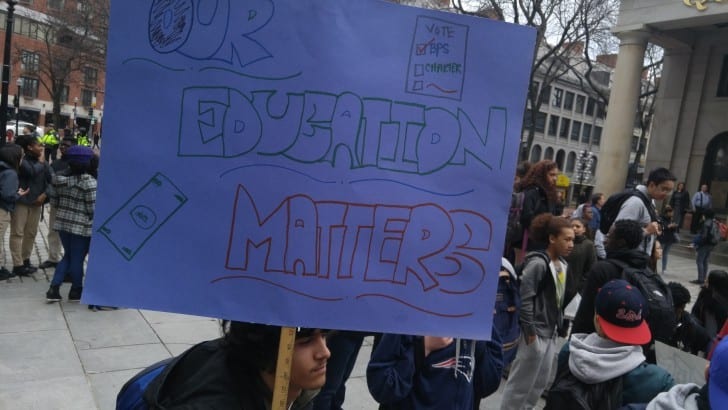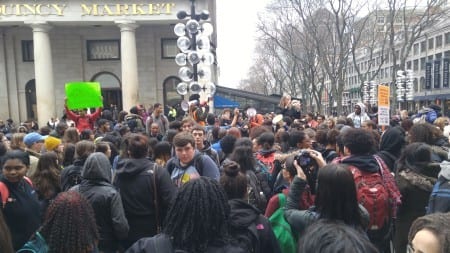How corporate ed reform threatens democracy
April 25, 2017
BY JASON PRAMAS @JASONPRAMAS
Over the last couple of decades, it has become fashionable for Americans to attack our public education system. Behind these attacks is that most un-American of attitudes: elitism. This is problematic for a number of reasons — the main one being that America remains a democracy. Not a perfect democracy where citizens get to vote on pretty much every decision at every level, but a system of government where citizens can at least have some political impact when they stand up for themselves in the voting booth and in daily life.
In a democracy, the education of all children capable of being educated is a vital necessity. Because, as a political system, it can only continue if its history, practices, and values are taught to young citizens by older citizens on an ongoing basis. Further, living in a democracy requires the experience of being directly socialized into its norms.
A public school therefore is both the training ground of our democratic society … and its mirror. Virtually every kind of young person in any given community is there. From every background represented in that locale. Kids from every race, sex, class, ethnicity, gender, ability, immigration status, and belief system. Understanding that we’re still a very segregated nation, and that all too many neighborhoods, towns, and cities remain relative monocultures.
Regardless, this generally diverse student body has to learn how to get along and work together toward common goals. Just like they will to one degree or another in their adult lives. This, more than any of the sadly diminishing number of civics classes on offer in today’s public schools, teaches students how to be active citizens in a democracy.
Or at least that was the ideal when public education became the standard a century back.
But that ideal has been replaced by a pernicious new mantra: Public schools don’t work. Our government can’t afford to educate every child. And we shouldn’t try. Political front groups bankrolled by corporations — ultimately seeking to privatize public schools and convert them into a profitable industry — are convincing average Americans to help destroy their own birthright to a good public education on little more evidence than such cynical slogans.
They are leading the charge to steal public funds from public education — more than $450 million this fiscal year alone in the Commonwealth, according to the Mass Teachers Association — and give them to charter schools that do not have a mandate to educate every child in their communities. Only the better students who have parents with the time and money to participate in mandatory charter school family activities.
Public schools are getting stripped of their best and brightest in this fashion. Sending their performance into decline in many instances and strengthening the argument that charter schools are inherently superior to the publics. Something that study after study shows is not the case.
Students in those charter schools do not sit in class with other students from every conceivable background. They sit with a limited selection of classmates.
And they are taught, whether their teachers intend it or not, to be elitists. Not just that they are smarter than other students — which can happen in any school — but that they are better than other students.
The same thing has happened for generations in private schools, too. But Americans do have the democratic right to organize private schools if they want to — as long as they are prepared to fund those schools without significant government support. And private schools have not attempted to tear down the public school system the way charter schools and the corporate titans behind them have been doing. Nor are they as damaging to our society as the often wildly anti-social and anti-democratic homeschooling movement has been. A topic for another day.
So, parents, remember that your decision about where to send your kids to school has very serious consequences for the future of our democracy.
And students, it’s true that no school is perfect, and that all schools suck at least some of the time. But where would you rather be? In a school that truly reflects your community and the best American values of equality, justice, and opportunity for all? Or in a school that only believes that “elite” students deserve a good education, and to hell with everyone else?
It’s your decision. As long as we remain a democratic nation.
This column was originally written for the Beyond Boston regional news digest show — co-produced by the Boston Institute for Nonprofit Journalism and several area public access television stations.
Apparent Horizon is syndicated by the Boston Institute for Nonprofit Journalism. Jason Pramas is BINJ’s network director and senior editor of DigBoston.
Copyright 2017 Jason Pramas. Licensed for use by the Boston Institute for Nonprofit Journalism and media outlets in its network.
Check out the Apparent Horizon Podcast on:
iTunes, Google Play Music, Blubrry, Stitcher, TuneIn, and YouTube

